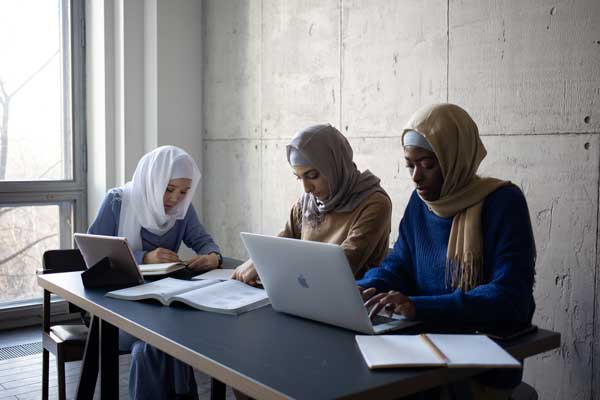So often, we, the female community, are told that we aren’t capable. And we witness the cultural narration of male superiority that stains people’s minds, still evident in our contemporary world. We experience or witness the cultural gender gap and female oppression in predominantly Muslim countries. I specify “culture,” because culture is where the injustice and oppression against women originates. Culture is what systematically and psychologically warps people’s minds about women. Islam, in contrast, honors women. Islam has established women rights, their dignity, and their worthiness. Any culture which does not implement fully the Islamic dictums and principles with regard to gender will fail to honor women in the way that Allah SWT ordains. We must banish the dark clouds of ignorance and seek to enlighten people about the Islamic view of gender identity, relations, and rights.
Gender Equality Versus Gender Equity
Gender equality can be defined as rights, responsibilities, and opportunities being accorded regardless of gender. Equality thus does not take into account the biological and natural tendencies of each gender. Yet, in the Qur’an, Allah SWT affirms the gender differences of the male and the female. The wife of Imran had made du’a to Allah SWT, wanting to dedicate her unborn child (Maryam, the mother of Jesus) to His service. The Qur’an says, “But when she delivered her, she said, ‘My Lord, I have delivered a female.’ And Allah was most knowing of what she delivered, and the male is not like the female…” (3:36). Gender differences are biological, an intrinsic nature. Because of gender differences, Islam aligns more with the views of gender equity than with gender equality. Gender equity means, according to a UNESCO summary review, “fairness of treatment for men and women according to their respective needs. This may include equal treatment or treatment that is different, but which is considered equivalent in terms of rights, benefits, obligations, and opportunities.”
An example of gender equity is in sports. There are separate leagues in most sports for men and for women. The obvious reason is that males and females have biological differences. Therefore, the separation promotes fairness rather than males and females competing together regardless of natural advantages or disadvantages. Males and females are not the same physically, mentally, or emotionally. With the specific strengths and weaknesses specific to each gender, Allah SWT gave each gender certain responsibilities in accordance with their nature.
The responsibility that has been firmly directed to men is to support his family financially (Qur’an 4:34). This includes any household costs and any and all costs to support members of the family. Although a woman does not have the responsibility of financial support of the family, she can rightfully earn, spend, and keep her money without interference. The responsibilities of women are to take care of the husband in the home as well as the children if there are any offspring. The high value and level of dignity accorded to the role of the mother is depicted in the Prophet (s) saying, “Paradise lies under the feet of mothers.”
The roles of men and women are meant to be complementary. This division of labor makes perfect sense and suits the intrinsic natures of the genders. The importance of the woman as the heart of the family rather than as a domestic worker is underscored by the behavior of the Prophet. He used to help his wife Aishah with household chores. When Aishah (r) was asked what the Prophet (s) when he was at home, she said, “He used to keep himself busy serving his family and when it was the time for prayer, he would go for it.” Men and women are expected to be “allies” to one another (Qur’an 9:71) and in a marriage, their roles are complementary. Both women and men equally have the right to consent to or reject a marriage proposal and each has the right to a divorce. However, men must pay a mahr (dowry) to the woman. If the woman initiates a divorce, she must pay back the mahr to the man.
Spiritual Equality
In the Qur’an, Allah SWT says, “And whoever does righteous deeds, whether male or female, while being a believer – those will enter Paradise and will not be wronged, by as much as the speck on a date seed” (4:124). In Islam, there is spiritual equality of the male and the female. The deeds of men and women are justly determined on the same scale. And as Shaykh Yasir Qadri points out, “The potential to enter Jannah is the same regardless of gender.”
In fact, the Qur’an does not attribute superiority based on biological gender. Allah SWT says in the Qur’an, “Surely the most noble of you in the sight of Allah is the most righteous among you” (49:13). That applies to all human beings, male and female. The Prophet’s wife, Umm Salama, once asked the Prophet (s) why Allah SWT addressed men in the Qur’an but not women specifically. Allah SWT soon revealed this verse: “Indeed, the Muslim men and Muslim women, the believing men and believing women, the obedient men and obedient women, the truthful men and truthful women, the patient men and patient women, the humble men and humble women, the charitable men and charitable women, the fasting men and fasting women, the men who guard their private parts and the women who do so, and the men who remember Allah often and the women who do so – for them Allah has prepared forgiveness and a great reward” (Qur’an 33:35).
Securing Our Space
The theme for this year’s Muslim Women’s Day is “Securing Our Space.” This is about learning to get out of our comfort zone and advocate for ourselves. Cultures stereotype women in various ways. Some characterize her as a domestic worker, no better than a servant. Some sexualize her and make it like her appearance is the most important thing about her rather than her character or her soul. Some cultures depict women as emotionally unstable. It is up to us to carry ourselves with respectability and embody the character that Islam enjoins upon human beings. We advocate for ourselves by working on ourselves, purifying our hearts, and emulating the Prophet in the way that he lived — with the greatest strength, dignity, and integrity. In this way, we are best capable of speaking up and demanding the full rights accorded to us by Islam.





